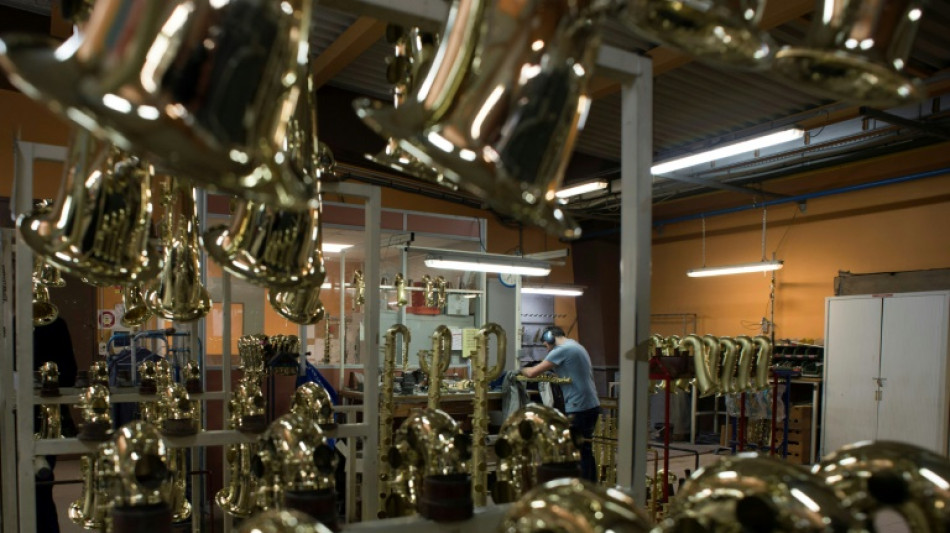
-
 Pakistan to play India at T20 World Cup after boycott called off
Pakistan to play India at T20 World Cup after boycott called off
-
Emergency measures hobble Cuba as fuel supplies dwindle under US pressure

-
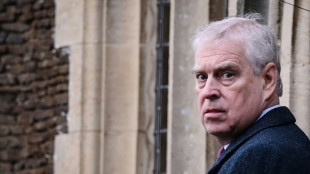 UK king voices 'concern' as police probe ex-prince Andrew over Epstein
UK king voices 'concern' as police probe ex-prince Andrew over Epstein
-
Spanish NGO says govt flouting own Franco memory law

-
 What next for Vonn after painful end to Olympic dream?
What next for Vonn after painful end to Olympic dream?
-
Main trial begins in landmark US addiction case against Meta, YouTube

-
 South Africa open T20 World Cup campaign with Canada thrashing
South Africa open T20 World Cup campaign with Canada thrashing
-
Epstein accomplice Maxwell seeks Trump clemency before testimony
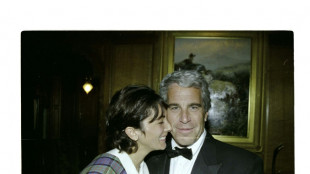
-
 Discord adopts facial recognition in child safety crackdown
Discord adopts facial recognition in child safety crackdown
-
Some striking NY nurses reach deal with employers

-
 Emergency measures kick in as Cuban fuel supplies dwindle under US pressure
Emergency measures kick in as Cuban fuel supplies dwindle under US pressure
-
EU chief backs Made-in-Europe push for 'strategic' sectors

-
 Machado ally 'kidnapped' after calling for Venezuela elections
Machado ally 'kidnapped' after calling for Venezuela elections
-
Epstein affair triggers crisis of trust in Norway

-
 AI chatbots give bad health advice, research finds
AI chatbots give bad health advice, research finds
-
Iran steps up arrests while remaining positive on US talks

-
 Frank issues rallying cry for 'desperate' Tottenham
Frank issues rallying cry for 'desperate' Tottenham
-
South Africa pile up 213-4 against Canada in T20 World Cup

-
 Brazil seeks to restore block of Rumble video app
Brazil seeks to restore block of Rumble video app
-
Gu's hopes of Olympic triple gold dashed, Vonn still in hospital

-
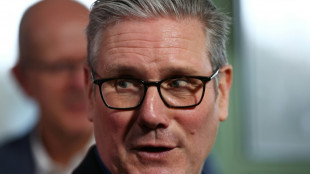 Pressure mounts on UK's Starmer as Scottish Labour leader urges him to quit
Pressure mounts on UK's Starmer as Scottish Labour leader urges him to quit
-
Macron backs ripping up vines as French wine sales dive

-
 Olympic freeski star Eileen Gu 'carrying weight of two countries'
Olympic freeski star Eileen Gu 'carrying weight of two countries'
-
Bank of France governor Francois Villeroy de Galhau to step down in June
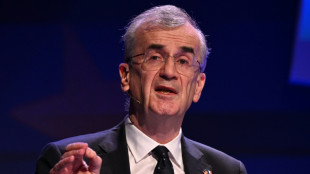
-
 Tokyo stocks strike record high after Japanese premier wins vote
Tokyo stocks strike record high after Japanese premier wins vote
-
'I need to improve', says Haaland after barren spell

-
 Italian suspect questioned over Sarajevo 'weekend snipers' killings: reports
Italian suspect questioned over Sarajevo 'weekend snipers' killings: reports
-
Von Allmen at the double as Nef seals Olympic team combined gold

-
 Newlyweds, but rivals, as Olympic duo pursue skeleton dreams
Newlyweds, but rivals, as Olympic duo pursue skeleton dreams
-
Carrick sees 'a lot more to do' to earn Man Utd job

-
 Olympic star Chloe Kim calls for 'compassion' after Trump attack on US teammate
Olympic star Chloe Kim calls for 'compassion' after Trump attack on US teammate
-
'All the pressure' on Pakistan as USA out to inflict another T20 shock

-
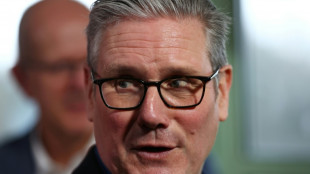 Starmer vows to remain as UK PM amid Epstein fallout
Starmer vows to remain as UK PM amid Epstein fallout
-
Howe would 'step aside' if right for Newcastle

-
 Sakamoto wants 'no regrets' as gold beckons in Olympic finale
Sakamoto wants 'no regrets' as gold beckons in Olympic finale
-
What next for Vonn after painful end of Olympic dream?

-
 Brain training reduces dementia risk by 25%, study finds
Brain training reduces dementia risk by 25%, study finds
-
Gremaud ends Gu's hopes of Olympic treble in freeski slopestyle

-
 Shiffrin and Johnson paired in Winter Olympics team combined
Shiffrin and Johnson paired in Winter Olympics team combined
-
UK's Starmer scrambles to limit Epstein fallout as aides quit
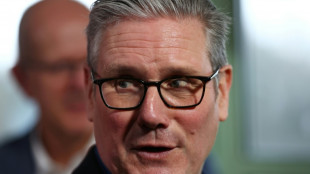
-
 US skater Malinin 'full of confidence' after first Olympic gold
US skater Malinin 'full of confidence' after first Olympic gold
-
Sydney police pepper spray protesters during rallies against Israeli president's visit

-
 Israel says killed four militants exiting Gaza tunnel
Israel says killed four militants exiting Gaza tunnel
-
Franzoni sets pace in Olympic team combined

-
 Captain's injury agony mars 'emotional' Italy debut at T20 World Cup
Captain's injury agony mars 'emotional' Italy debut at T20 World Cup
-
Family matters: Thaksin's party down, maybe not out

-
 African players in Europe: Ouattara fires another winner for Bees
African players in Europe: Ouattara fires another winner for Bees
-
Pressure grows on UK's Starmer over Epstein fallout
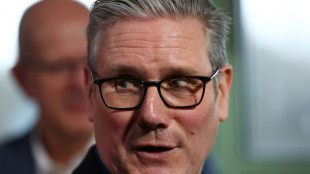
-
 Music world mourns Ghana's Ebo Taylor, founding father of highlife
Music world mourns Ghana's Ebo Taylor, founding father of highlife
-
HK mogul's ex-workers 'broke down in tears' as they watched sentencing

| CMSC | 0.06% | 23.585 | $ | |
| SCS | 0.12% | 16.14 | $ | |
| NGG | -0.11% | 87.965 | $ | |
| BCC | -0.9% | 90.22 | $ | |
| GSK | -1.95% | 59.08 | $ | |
| BTI | -2.97% | 60.99 | $ | |
| RYCEF | 2.65% | 17.34 | $ | |
| BCE | 1.28% | 25.405 | $ | |
| RIO | 3.24% | 96.54 | $ | |
| AZN | -2.53% | 188.26 | $ | |
| BP | 0.73% | 39.295 | $ | |
| RELX | -0.12% | 29.345 | $ | |
| JRI | -1.01% | 12.84 | $ | |
| VOD | 2.36% | 15.475 | $ | |
| CMSD | 0.08% | 23.97 | $ | |
| RBGPF | 0.12% | 82.5 | $ |

Pharoah Sanders, cosmic jazz saxophonist, dead at 81
Pharoah Sanders, one of the most wildly inventive figures in jazz who wrestled his saxophone to its limits and felt equally at home in Indian and African music, died Saturday. He was 81.
His record label, Luaka Bop, said he died peacefully around friends and family in Los Angeles.
"Always and forever the most beautiful human being, may he rest in peace," a label statement said.
Taking the open-mindedness of the free jazz movement to new heights, Sanders would virtually attack his saxophone by heavily overblowing on the mouthpiece -- of which he collected hundreds -- as well as biting the reed and even shouting into the bell of the instrument.
Sanders, a disciple of John Coltrane, who played aggressive solos on the jazz master's classic late-career "Live in Japan" album, was often seen as a sort of successor to the global-minded legend after Coltrane's sudden death in 1967.
Ornette Coleman -- arguably the most important pioneer of free jazz -- called Sanders "probably the best tenor player in the world."
But Sanders, who to a lesser extent played soprano and alto sax as well, also divided audiences and never reached quite the same commercial success as Coltrane, Coleman or other historic jazz innovators.
With solos that built from screeching and squawking to silky and melodic, Sanders was described as a godfather of spiritual or even cosmic jazz, although the reticent musician brushed aside labels.
His best-known works included "The Creator Has a Master Plan," a nearly 33-minute track off his "Karma" album on which Sanders sounds as if he is exorcising demons, before reaching back to a heavenly state.
Leon Thomas sings on the track, released in 1969 at the apex of counterculture, with the lines, "The creator has a master plan / Peace and happiness for every man."
"Upper Egypt and Lower Egypt," off Sanders' influential 1967 "Tauhid" album, builds off guitar twangs and a gentle xylophone paying tribute to African tradition as Sanders storms in with a saxophone that sounds like tortured howls.
- Seeing saxophone as self -
"I don't really see the horn anymore. I'm trying to see myself," he said in the liner notes to "Tauhid," his first album on the Impulse! label that put out Coltrane.
"And similarly, as to the sounds I get, it's not that I'm trying to scream on my horn, I'm just trying to put all my feelings into the horn," he said.
Farrell Sanders -- he changed his first name's spelling at the encouragement of futuristic jazz composer Sun Ra -- was born and raised in segregated Little Rock, Arkansas, where he played clarinet in a school band and explored jazz from touring artists.
He moved after high school to Oakland, California, where for the first time he enjoyed the freedom to attend racially mixed clubs and had a fateful first meeting with Coltrane as they shopped for mouthpieces.
He later headed to New York where he at times fell into homelessness, working as a cook and even selling his blood to survive.
He met Sun Ra while cooking at a Greenwich Village club. Discovering his musical talent, Sun Ra and Coltrane enlisted Sanders as a band member, with Sanders coming into his own as a band leader after Coltrane's death.
Describing his style in a 1996 interview with the San Francisco Chronicle, Sanders said: "I have a dark sound; a lot of the younger guys have a bright sound, but I like a dark sound with more roundness, more depth and feeling in it," he said.
"I want my sound to be like a fragrance that people will like -- something fresh, like the smell of your grandmother's cake cooking," he said.
- Spiritual explorations -
Sanders -- distinctive in his later years for his long white beard and fez cap -- dabbled in pop music, starting with 1971's "Thembi," named after his wife.
But his mainstream direction was brief and he often found more musical kinship outside the United States. On 1969's "Jewels of Thought," Sanders explored mysticism from across Africa, opening with a Sufi meditation for peace.
Decades later on "The Trance of Seven Colors," Sanders collaborated with Mahmoud Guinia, the Moroccan master of the spiritual gnawa music and of the guembri lute.
Sanders' 1996 album "Message from Home" delved into the influences of sub-Saharan Africa including highlife, the pop mix of Western and traditional music that originated in Ghana.
He also explored Indian form with his collaborations with Alice Coltrane, the jazz master's second wife, who became a yogi.
Sanders voiced the most admiration for Indian musicians, including Bismillah Khan, who brought a wider audience to the shehnai, a type of oboe played frequently at processions on the subcontinent, and Ravi Shankar, who made the sitar international.
Sanders, accustomed to the sharing of energy within jazz bands, described Indian musicians as achieving "pure music."
"Nobody is trying to cut each other's throat. There's no ego," he told the San Francisco Chronicle.
Describing his own music, he said: "I want to take the audience on a spiritual journey; I want to stir them up, excite them. Then I bring them back with a calming feeling."
D.Cunningha--AMWN
